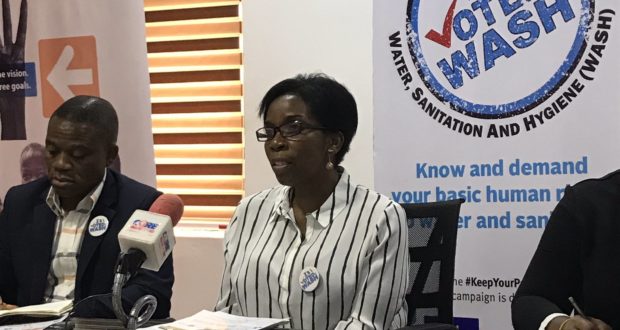WaterAid has joined a team of experts from around the world to establish a definition of menstrual health that comprehensively addresses the needs of people who menstruate to advance gender equality and global health.

Despite increased global attention on period poverty, up until now there has been no universal agreement on the definition of menstrual health, which has diluted advocacy efforts and led to fragmented action. However, WaterAid hopes that having a new definition will provide a common language, harmonise approaches and unite efforts to support the range of menstrual needs.
Recently published in the journal Sexual and Reproductive Health Matters, menstrual health is defined as “a state of complete physical, mental, and social well-being and not merely the absence of disease or infirmity, in relation to the menstrual cycle.”
The new definition, launched on Menstrual Hygiene Day on May 28, 2021 and brought together by theGlobal Menstrual Collective is grounded in theWorld Health Organisation (WHO) definition of health, and sets out clear requirements for achieving menstrual health.
These include access to clean water, good sanitation and hygiene, access to information about the menstrual cycle and self-care, materials, timely diagnosis and treatment for menstrual disorders and discomforts, and a positive and respectful environment and the freedom to participate in all spheres of life throughout the menstrual cycle.
Senior author Thérèse Mahon, Regional Programme Manager South Asia at WaterAid, said: “By defining menstrual health holistically, we aim to bring together stakeholders and help ensure menstrual needs are prioritised by all responsible. As we’re starting to see UK aid cuts around programmes addressing water and sanitation, sexual and reproductive health and girls’ education, it’s never been more important for governments to reaffirm their commitments to gender equality and to take action.
“Large-scale investment is needed to improve menstrual health as well as water and sanitation provision, but co-ordination is needed across sectors. Adopting this new definition and a shared vocabulary will improve collaboration and investment in sexual and reproductive health, gender, education, water, sanitation and hygiene to ensure no one is held back because of their period.”
As the world continues to grapple with the impacts of COVID-19 on health, livelihoods and socio-economic activities, women, and girls, especially the poorest and most marginalised who already faced health and safety implications in managing their menstruation without access to clean water and private toilets before the crisis, are finding that the pandemic has only exacerbated the obstacles they face in managing their periods.
On Menstrual Hygiene Day, WaterAid Nigeria is urged the government to take urgent action to increase investment in menstrual health and empower women and girls to unlock educational and economic opportunities through improved access to clean water, sanitation, and hygiene.
The shame and stigma around periods prevents women and girls from engaging in conversations around their periods. Persisting taboos around menstruation results in the exclusion of women and girls from socio-economic activities and contributes a threat to the overarching theme of the Sustainable Development Goals to leave no one behind, according to WaterAid.
The theme for this year’s campaign, “More action and investment in menstrual health and hygiene now!” was described by the group as a call to step up investment in menstrual health to ensure no woman or girl is held back because she menstruates.
Evelyn Mere, Country Director, WaterAid Nigeria, said: “We need to create a world where no woman or girl is held back because she menstruates. This means a world in which every woman and girl is empowered to manage her menstruation safely, hygienically, with confidence and without shame.
“Menstrual health is vital to the empowerment and well-being of women and girls and beyond access to affordable sanitary products and water, sanitation and hygiene facilities, it is also about ensuring women and girls live in an environment that values and supports their ability to manage their menstruation with dignity. It is about helping women and girls and all the people around them have the information awareness and the knowledge around this issue. It’s about making sure we have services that respond to the needs of our young girls and women.
“Menstrual health is a human rights issue that matters to the achievement of several Sustainable Development Goals including the goals on health (3), education (4), gender equality (5), water and sanitation (6), economic growth (8) and sustainable consumption and production patterns (12).
“A lack of water, sanitation, and hygiene facilities in public places like schools, offices, and healthcare centres means millions of women and girls are unable to manage their menstruation with dignity. It is a situation that is further fostering inequality and affecting the health of millions of women and girls This is unacceptable and things need to change.
“We are calling on the government and relevant stakeholders to:
- Include menstrual health in post pandemic recovery plans, including mobilising resources to facilitate water, sanitation and hygiene facilities in public places that will provide safe and private spaces for women and girls to manage their periods hygienically.
- Increase access to sanitary products by partnering with the private sector to supply disposable sanitary products to girls in school and marginalised women.
- Follow the example of 36 countries including Kenya, India, South Africa, New Zealand and the UK who have applied either a tax reduction or exemption to menstrual products and are providing free period products in schools and public institutions.
- Reduce the stigma and shame around menstruation by promoting open discussion of menstrual health and hygiene and curriculum policy reforms.”
